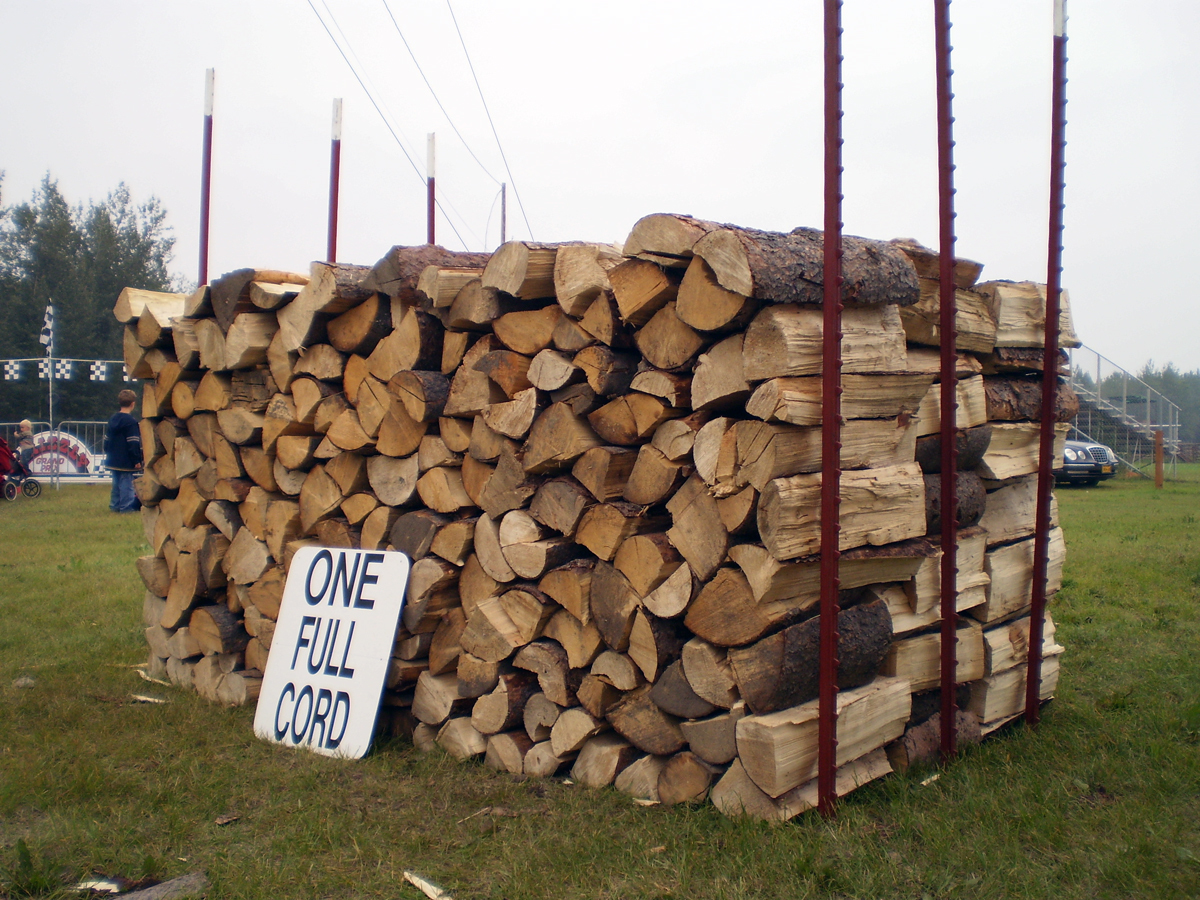I don’t live in a car-free city, but I wish I would. Fuck cars and especially fuck the people in them. I live in a pedestrian zone, but connected to the main artery through the city. You would think that labeling something as a pedestrian zone would reduce the amount of cars going through, but no, it’s just a second main street. Might as well take down the ped zone sign, it gets ignored anyway, so why waste money making one?
When we have a pedestrian sone here, there are bollards at each end. It tends to discourage most cars.
I wouldn’t mind being able to give up my car and truck. But since I’m out in rural parts. It wouldn’t workout too well when it came to other needs.
I lived in rural places without a car. This is an American problem because of policy not because you are rural.
I have trailers I use haul firewood and such. I burn about 3 quarts a year.
I have trailers I use haul firewood and such. I burn about 3 quarts a year.
If that’s for heating, ideally you’d be using a heat pump / reverse cycle AC as wood burning heaters are harmful to health due to PM2.5 particles and bad for the environment due to emissions. But I get that there is a bit of an upfront cost that may be dissuading you.
Normal people outside of America in rural places live in communities that can arrange for firewood delivery. The only reason you need your own truck is because you don’t have any semblance of infrastructure, community or mutual aid. This is a policy choice and a failure of your culture.
@PastaCeci @Elmerfuddz
It’s even worse than THAT: those huge trucks you see nowadays are almost never used to haul anything, and the owners don’t even try to pretend anymore -they acknowledge that it’s just about giving off a manly image.I’ve lived in a rural area and my neighbors were always happy to lend me something if I needed it. If I needed a truck to haul wood I could just borrow one, or even get it delivered.
Not the person you replied too, but US is so large, I can imagine there’s situations where policy can’t support those sorts of things. Not mention the fact that people who live in rural areas are more likely to have a culture of not wanting to interact with others and doing things on their own. Regardless, many of the policy changes to reduce car usage are really aimed at reducing car usage in dense areas rather than outright bans or the like. If these policies continue to work out in the US, the relatively few people living in rural areas with vehicles wouldn’t be problematic (in terms of causing traffic nor causing injuries/deaths)
@Habahnow @PastaCeci “I want to do it my self” says man purchasing petrol from Iraq to fuel a car manufactured by thousands of people and assembled in a dozen countries.
Anyone actually doing things by themselves isn’t concerned with car policy as they know they can’t produce a car.
They already are happy to purchase things from a store that have been delivered to that store in a collective way, what is weird about getting wood delivered to their property?
I feel this is such an dramatic and reaching response it’s almost like your intentionally being obtuse.
Some people like reducing their reliance on other people. It seems I need to emphasize the word REDUCE. I chose that word specifically instead of remove because as you pointed out, removing reliance on others is very difficult. These people sre the type of people I am referring to when I say they like to do things on their own.
They are propagandized and agents for the global empire. Their feelings about independence is bullshit and they are a drain on the rest of the world subsidizing their lifestyle.
@Habahnow yes, going from 1000 to 999 is a major achievement and something to bi proud of.
The US is in no way exceptional or different than anywhere else.
Only in America is “doing things on their own” involve running a global empire to ensure their supply of oil. Without the federal government subsidizing rural people in America it would be physically impossible for them to live there, this is literally the opposite of being independent they are extremely dependent on massive globalized infrastructure.
Not everyone wants the US to run a global empire and coincidentally, the people were talking about are more likely to want the US interfering less with their lives and outside the country.
Then they better get used to not having trucks.
Cord of wood for anyone interested or just hasn’t visualized how much for wood a cord is

We don’t just want “car-free cities” for the sake of it… We want walkable cities with infrastructure and proximity to needs/wants built with pedestrians in mind
Don’t know about other Americans, but I would love to be able to have this kind of lifestyle. It’s just not realistic over here due to the infrastructure. It’s not within my power to make the changes necessary for it though.
It can start by advocating for new pedestrian areas in your city or town, maybe it’s only a block, but it’s a start
I wanna live in one 😭
Taking suggestions on cities lol!
I lived across the street from a department store, a grocery, some pizza places, a “smoke” shop, video game stores, and everything else I could want on a normal day. It was amazing. I walked everywhere except to work. I miss living there. The main downside was that it was in Florida.
St Augustine?
Nah, it was Orlando, but not the city proper, more like one of the smaller areas around the actual city. Trying not to give too much away, but it was near Altamonte Springs.
Sorry wasn’t trying to have you dox yourself, I actually do know Orlando pretty well so I think I know where you mean
lol, no prob.
Show me a car free neighborhood and I’ll show you insane real estate prices due to demand.
Then people will point to those prices as proof it’s a “failure” then spend 2-3x what they “save” on housing on auto loans/expenses.
To answer your question on why people are hesitant: they’re not worried about the cities per se, but about the mentality that will then turn its attention to the suburbs and rural areas. There are people who don’t want to live 10mins away from grocery stores because they don’t grocery shops, or other crowdy places with people milling about. Some of us want to be hermits and live relatively secluded
All that said, I like car free cities. I don’t want denser suburbs tho
I don’t want suburbs at all and public policy should make suburbs unaffordable.
Why don’t you want suburbs? Or I guess, the question is why don’t you want other people to have them?
Suburbs, are inherently higher carbon emitting that proper urban areas. For an extreme example, if everyone in the US lived in an area with similar characteristics to NYC, it would reduce the counties carbon emissions by 3/4.
Beyond that, they’re only really able to exist, as they do in the US, thanks to exploitative and predatory economic practices. Almost no one who lives there makes their money there, they work somewhere else, extracting value, and then bringing it back to the suburb to fund incredibly inefficient infrastructure.
I’m not saying ban them complete, I’m just saying, take away the massive amount of economic incentives and support that makes them possible. Build out housing in cities and ensure the value generated in them goes to funding their services, infrastructure and development of the cities.
Make the suburbs pay for them selves and they will nearly disappear very quickly.
Beyond that, they’re only really able to exist, as they do in the US, thanks to exploitative and predatory economic practices. Almost no one who lives there makes their money there, they work somewhere else, extracting value, and then bringing it back to the suburb to fund incredibly inefficient infrastructure.
I don’t think this is true with remote work. Also, there are businesses nearby which operate on location—architectural firms, dance studios, lawyers, accountants etc. So I think painting suburbs as “predatory” or “absent of economic activity” is an inaccurate and incomplete description.
Regarding the carbon footprint: yes, that can be improved by more commuter rails to the suburbs, and improved energy efficiency in older houses. Encouraging people to grow native plants in green spaces will also help as opposed to “manicured lawn culture”.
I think you’re undervaluing how much people want to live outside of busy spaces, so there will always be some support for suburban living. From my pov, I am more in favor of the rustic, idyllic spaces as opposed to the overpaved, McMansion scenarios that maybe you’re describing?
If you are willing to pay $100/gallon of gasoline, pay for all the roads, pay for the carbon externalities of both the cars and the roads, and pay for the water infrastructure and basically live in a Galt’s Gulch, then sure, you can do whatever you want. But that isn’t the case today.
Removing cars from urban areas means lower carbon emissions, less air pollution, and fewer road traffic accidents
Not to mention how much quieter it is.
Why would anyone hate that? To me it sounds like a utopia. I just had to buy new tires for my car @#$%*!
“People don’t want to give up their freedom”
- The older generation
Boomers. I was blown away when I went to a city hall meeting about expanding the roads and hearing their hot takes.
After the wave of old boomers (most of the audience) complained about how dangerous the whole world has become that they can’t even take their trash out on the street, they say a walkable city just opens up “more danger”.
To them, walkable streets means seeing more diversity, which is apparently super scary.
It makes perfect sense when you understand modern city design as a form of mostly unconscious but purposeful violence, that pretty much defines the middle class Boomer generation in wealthy rich countries. Structural violence… as far as the eye can see!
US Boomers love that shit, the prison system, healthcare, highway design, the tax filing system the list just goes on and on.
I really wish my parents generation could have just been skipped and instead I had parents from the previous generation who actually fought for something and understood how to defend workers rights.
“Hard times create strong men. Strong men create good times. Good times create weak men. And, weak men create hard times.“
Yeah, what about my property values?? Will someone think of my property valuessss 😭😭😭
I’ve already warmed up to the idea that we’d have to force positives changes through in the dead of night. With all things said and done, watch those who’d rail against it say they’ve always been in favor of it.
It’s like when chuds try to take credit for civil rights (since Republicans back then supported it and southern Democrats opppsed it) or 5 day work weeks (Henry Ford willed the concept into existence, not years of direct action by the labor movement).
The secret to making things better in the world is that you can’t rely on people making good choices, you have to remove the bad choices.
I love living car free with my needs in walking/biking distance. However I feel like the car centric problem runs deeper than basic groceries and transit to work. I live near the gorgeous rocky mountains, but our buses only really run to the ski slopes, and only in winter. It’s a true shame to be so close to nature and have my option for access restricted to a rental car. So naturally there’s a plan to build the worlds largest gondola directly to resorts to address traffic. Cause god forbid we just ran more effective bus service year round.
Gondolas can actually work as public transit. Depending on terrain they are actually a very efficient solution. You can find them in a few cities.
Gondolas are probably a lot more efficient than busses though, I’d have thought.
But they will not stop at any trailheads, just the resorts. Additionally it is unnecessarily expensive to build and ride. Also the additional environmental impact of building and maintaining it rather than using existing roads. It’s purely being built for convenience to reduce traffic in/out of the canyon.
My 2 cents: Living in a climate that gets all the seasons, a car makes things much easier in the winter for numerous reasons. Also, as someone that lives with chronic pain issues, walking or biking places on a daily is quite difficult for me, again, having a car resolves this.
Yeah, it gets to 48C in the summer here and biking or walking is not a preferred option unless showering at workplaces becomes a new norm
I understand you may not have lived carefree but here’s two places with extreme weather that do fine without cars (provided people invest the minimum amount to establish public transport):
Winter (Norway, way below freezing): https://youtube.com/watch?v=Uhx-26GfCBU
Summer (Taiwan, 36C+): https://www.youtube.com/watch?v=1dBk7lq8o1Y
@sturmblast
Ok
(add (un)appropriate prefix as needed)As a so-called ‘ban cars’ advocate;
I -wholly- get that private automobiles are a huge boon to folks who are severely otherwise challenged to get from where they are to where they want(need) to go.
by no means have I any -want nor desire- to throw obstructions in their way.
Rather, get rid of the obstructions presented by abled folks who just don’t want to walk a few blocks, take up all the spaces, and such just because entitled.
@ylaiI think the term “car free” is a misnomer, more like “car as a non primary form of transport for most people most of the time” is more accurate but doesn’t roll off the tongue as well.
There are a lot of people with mobility issues in such cities that are serviced in different ways, a lot of times with specially licensed cars etc.
I like the term multi-modal. Everybody should have access to all kind of modes of transportation. And you can pick the best fit depending on your task.
Going to the dentist? Bike. Getting bread at the bakery? Walk. Commuting? Train. Heavy stuff to get to your parents’ house? Carsharing. And so on.
Good quality public transit can solve those issues as well. We should have a variety of options available for a variety of people who need them.
Yeah, I hate the term “car-free”. That said, even for someone who primarily uses a car, advocating for bike lanes and public transit makes sense, as the fewer people there are taking up road space and parking, the easier it is for you to drive / park.
Ah yes, winter! I live in a wintery place (Quebec) and cars in winter need very much care to work properly. They need plowed and salted streets or they get stuck or can’t go uphill. If that level of care was the same for pedestrians and cyclists, it would be much easier to move around without a car.
Also, you may need a car because of chronic pain but surely not everyone driving a car needs one for chronic pain? And wouldn’t it be nicer for people that really need a car if there were fewer cars around?
I’m in my early 40ies and lived all those winters without a car and I still think it’s silly to say they are “adapted” or “working well” in winter. Every winter there are multi car collisions/pile-ups on highways. They slip and slide easily. Multiple times in a year cars can’t climb the little hill in front of my place. It takes even more space to park them as there are snowbanks everywhere. Sometimes they get covered in ice.
I really can’t see the appeal of a car in winter.
Is there a FAQ about living in car free cities? For example, how do you travel to another city? What do you do if the city has high slopes making walking and biking too hard? Or how do elders deal with what other citizens would take for granted in terms of mobility?
public transport of course. buses go uphill you know.
It’s cool and all, but trains have fixed routes that can’t take you almost everywhere. Of course I’d prefer trains over highways, just stating the current fact. Take for example every city I’ve lived in Mexico: trains never were an option to travel between cities. That’s changing, fortunately.
PEVs are still not very common around here, but that answers some questions. Thanks for your reply.
sensible places have enough railways that trains can practically take you everywhere, used to be that here in sweden we had railways even to teensy tiny villages a lot of the time.
Trains can take you most places and busses will take you pretty much anywhere trains don’t. Taxis fill the gap on everything else.
Just go travel somewhere like China or Japan or a lot of Europe and you’ll see for yourself.
Also “car free” doesn’t have to mean literally zero cars allowed, but just build and layout the city so you never have to use one for daily errands.
I live next to a grocery store and it’s literally the best thing ever, grocery trips take 10 minutes max, I only end up using the car on weekends for hobbies or to visit family and friends.
From what I’ve seen from Not Just Bikes, there’s also car-sharing. There are services to make it super easy to borrow a car for as little as a few hours if you just need to lug some furniture or something.
“Car-free cities” gave the wrong idea. I’d call them walk-friendly cities instead, but I guess that ship has already sailed. Thank you for sharing your knowledge and first-hand experience.
The term “city” can actually be confusing too since it might mean the most central district of a metropolitan area, or it could mean the whole metropolitan area. There is some desire to make the most central parts car free in the way you thought (usually street by street in the centre of the CBD etc), but generally the broader area will not be.
What do you do if the city has high slopes making walking and biking too hard?
E-bikes and regular bikes with good gearing. And walking up slopes generally isn’t too challenging it’s just slow. Infrastructure can help here too by making sure there are paths that don’t go up hills unnecessarily. Fast and frequent public transport provides another option where walking and biking is less viable.
For example, how do you travel to another city?
Trains and buses. Car as a last resort (preferably one that is hired rather than owned, and preferably electric rather than an ICE).
Or how do elders deal with what other citizens would take for granted in terms of mobility?
Elderly people can’t (or shouldn’t) drive either so better walkability = better for the elderly since it gives options to get around without relying on a car. Good infrastructure design can help with disability access, and many disabled people can’t drive anyway.
For example, how do you travel to another city?
Train or car. Car free mostly refers to inner city trips, for special occasions it’s totally fine to use a car (e.g. moving, buying something big, a weekend trip, etc)
What do you do if the city has high slopes making walking and biking too hard?
Bus, ebikes, other types of electric assist stuff, walking. Crazy steep slopes do put a limit on exclusively human powered mobility (i.e. walking and cycling), but those places are incredibly rare.
Or how do elders deal with what other citizens would take for granted in terms of mobility?
A walkable city features amenities close by, plenty of benches to rest, and a solid bus system. There are absolutely no issues for people with restricted mobility. This applies to people with disabilities as well btw.
In fact I would turn that question around: how do elders deal with the requirement to drive a car to get groceries, etc? Isn’t that like super duper dangerous?
Thank you for your detailed reply. I was under the impression that cars and buses were out of the question. This clarifies a lot. Ebikes and electric devices, however, sound to me like something futuristic, probably because I live in latinamerica.
Steep-slope places are not the norm almost anywhere, but they are not really that scarce here. We probably would need to make some technological catch up.
About elders driving, well, it’s common that they have cars although they can’t/shouldn’t drive them. Some younger ones can step in and volunteer, usually family members, but not only. An arrangement can always be made when young people hardly owns a car.
Steep-slope places are not the norm almost anywhere, but they are not really that scarce here. We probably would need to make some technological catch up.
No worries Switzerland and Austria have you covered. Gondolas are only suitable for people and lighter loads, but funiculars can carry a ton of weight and can be built quite steep indeed, Chile has quite a few of them. In less extreme cases there’s good old rack railways. Funiculars are actually the oldest type of public transport in the world, invented before the industrial revolution, back then operated by water power (fill a tank in the top car, it will pull the bottom car up), and rack rail isn’t exactly new. The oldest were built to get stuff up and down from castles. Gondolas of the Mi Teleficero type are quite a bit newer and can reach quite impressive throughput numbers as the gondolas are unhooked from the wire in stations to make it possible to have a fast wire while not having to sprint when getting on (usually they move about at like 1/2 walking pace in the stations but you can also stop them completely for the elderly).
Ebikes and electric devices, however, sound to me like something futuristic
There are kits enabling you to convert a muscle bike (push bike) into an e-bike. If you get one with a torque sensor, then it will detect how hard you push on the pedals and drive the motor proportional to that force. So you still must pedal but it amplifies your effort which preserves the natural feel and control of pedaling. It essentially makes the hills go away; a hilly place becomes a flat place.
how do elders deal with the requirement to drive a car to get groceries, etc? Isn’t that like super duper dangerous?
Judging by some folks I’ve seen driving around with oxygen tubes in their noses: They just drive. And, yes, it is dangerous.
Or how do elders deal with what other citizens would take for granted in terms of mobility?
Currently they alll use little electric mobility scooters, in cycle lanes when available, bacause its too dangerous to be any where there are cars here in Australia.
How do those with epilepsy get around, they can’t drive at least they can’t here in Australia. One lady with epilepsy I knew rode a little electric scoot, she loved having her independence.
What happens to people when they loose thier license in the US ?
I couldn’t tell. Barely know the US and it’s been a long time. Those were questions over the top of my head, out of curiosity, and coming from the wrong assumption that these cities were totally car-free with the only exception of emergency vehicles.
how do you travel to another city?
Train, bus, electrical bike, rideshares for the last mile maybe.
What do you do if the city has high slopes making walking and biking too hard?
Get off and walk, use a bike with electrical assistance, use a different type of mobility assistance if i am very physically impaired.
how do elders deal with what other citizens would take for granted in terms of mobility?
See above + Elders are typically more physically able due to having lived a life of regular everyday exery + their everyday destinations are not several miles away + “car free” doesn’t paradoxically mean free of cars, just almost all cars - ambulances are still needed for example - as such if a person is so impaired that no mobility assistance is enough to get them to their destination, then they can still be taxied by help.
how do you travel to another city?
Usually by bus or train.
What do you do if the city has high slopes making walking and biking too hard?
Walking is good for you, biking is not too popular in cities with slopes, but electic bikes are changing that.
Or how do elders deal with what other citizens would take for granted in terms of mobility?
There is definitely less mobility, but that is part of getting older isn’t it? Usually they just walk a bit slower and use busses and taxies.
Or how do elders deal with what other citizens would take for granted in terms of mobility?
Electric mobility scooters as well. I’m sure those are capable of much better range now, and it should keep getting better, and everything they need would ideally be close by
And what about cities with cold winters and tons of snow? 10 minutes outside here is no joke
Why Canadians Can’t Bike in the Winter (but Finnish people can)
Basically, proper bike infrastructure and snow-clearing make a world of difference. It’s not nearly as bad as it seems if you just put on a coat and get going.
Something like this?
https://ebikehaul.com/products/q-runner-all-weather-4-wheel-mobility-electric-scooter
It’s still speed limited, it’s not a car.
Edit: that is a tad expensive though, would need to get costs down
I’m going to let you in on a secret, even though our Canadian cities are shit for people with a car there are still thousands of people in every city who get by year after year without one, because they can’t afford to buy one.
Not having a car sucks, but it is not a death sentence and would be a hell of a lot better if our cities didn’t assume everyone had one.
You dress appropriately for the weather and the city actually bothers to clear the bike path quickly when it snows. Oulu does it that way.
I live in Toronto, and I don’t have a car. I use buses and subways for most of my commute in winter. Along with these options, I use rideshare (public bicycle rentals) in every other season. There are people who bike even in winter but I’m nowhere close to that hardcore. I’ve spent maybe $250 on uber for dire situations in the last one year - that would’ve been a monthly auto insurance payment.
I waited for a bus for around 20 minutes in -18°C a few weeks back. The biggest problem was that I had overdressed so I started sweating and had to unzip a layer.
An important fact that people who have only ever lived in suburbs miss is that you don’t have to commute thaaat far thaaat often when you live in walkable cities. My cousin who lives in a suburb, drives for ~20 minutes to get to the closest big box store. I have 5 options groceries in a 1km radius and one of them is just one block over. So, I don’t even need a bus for groceries, let alone a car. We have seniors who definitely shouldn’t be driving walking around with grocery carts on the sidewalks. So, reducing car dependency improves mobility - not the opposite.
I drove from Dallas to Toronto in 2017 (you know, for fun), and I was amazed not only at how trim almost everyone looked but also at how many fucking people were on bicycles. Coming from the concrete jungle that is DFW, it was genuinely inspiring.
I’m happy to report that the number is cyclists is increasing every year with the addition of more bike lanes and a growing network of bikeshare stations. :)
Wouldn’t the elderly be a huge benefiter of a car free city? You get old enough or frail enough that you can’t drive. Then what?
I like in a city that provides free busses and trains to those aged 65+ if they ride in off peak hours, and it’s heavily used. This is in a city designed around cars.
What do you do if the city has high slopes making walking and biking too hard?
You shift to a lower gear and go up the hill
how do you travel to another city
Car co-ops is one way.
I have a car, but I’m also in one as it gives me access to different vehicle types that I sometimes need.
To get some places here I also need to take a ferry, and walking on and renting a car on the other end can be situationally cheaper.
What do you do if the city has high slopes making walking and biking too hard?
skill issue. i live in a very hilly area and when i reach a steep slope i simply bike harder.
this is ableist as hell tbh
Use an ebike?
Consider people who are physically impaired instead of dismissing real problems?
There are many forms of personal mobility devices (some are even like speed limited, miniature, single person EVs) that make navigating a car free city easy for someone with impaired mobility.
Getting cars out of the way makes it easier to accommodate many levels of movement ability, not harder.
Yes we agree. So the response is not “its not an issue” the response is that there are alternatives to bikes. I perceived your response as a sort of sarcastic dismissal and I see now I misread the tone and content, sorry.
There’s wheelchair accessible bikes, but you are actually correct. Good urbanism requires us to take into account not just those who conform to society, but all it’s people. Interestingly an inclusive and accommodating city is also an economically strong one - in the long run more productive potential is freed and less resources are spent on patch-fixing a broken structure.
This is your reminder to read Invisible Women by Criado Perez
There’s wheelchair accessible bikes
oh damn that’s cool as hell. as a general statement i’m not anti-bike or anything, i am just annoyed at how little care some people here have for those who are less able than they are
Good urbanism requires us to take into account not just those who conform to society, but all it’s people
100% agreed, and i think our rhetoric should reflect that inclusiveness rather than just defaulting to “can’t do it? fuck you”
Yeah the bikes are super cool, there’s lots of different ones too. I once got overtaken by a guy who pedalled with his arms, made me feel like a scrub.
It is a big issue when we don’t plan for those that don’t fit into our ideal of a “normal” person, because when we default to that we default to planning for men - and really planning for no one.
If you’re interested you should look up “gendermainstreaming”. Vienna has a very good manual on it.I think people here get defensive about bikes because they’re used to arguing against carbrained folks all the time. It should also be noted a city designed for bikes and walkability will be easier to travel in for those who have trouble walking, than a city designed for cars, even if concessions aren’t made.

no, he’s right
 you’re right, not everyone can use bikes so telling people to use bikes is ableist. genius. you’re a real thinker. they’ll be reading about you in the history books centuries from now
you’re right, not everyone can use bikes so telling people to use bikes is ableist. genius. you’re a real thinker. they’ll be reading about you in the history books centuries from nowno, saying skill issue to people who aren’t able to bike up steep hills when there are other options such as pedal assist is unhelpful and ableist. it doesn’t take being a ‘thinker’ to deduce that.

this is such a silly non-issue to whine at a comrade for. it’s not ableist. obviously if you have a medical condition preventing you from riding up a hill then my comment doesn’t fucking apply to you, idiot

just a friendly heads up, I think you misgendered the person you were referring to.
oh shit! i feel like an asshole. my bad, i am fixing it
Totalled my car three years ago. Never bothered buying a new one. I save a lot of money and accepting my faith when relying on public transport has given me so much mental freedom. I take the train to work and the last part of the route is by shared bikes. Love it.

























